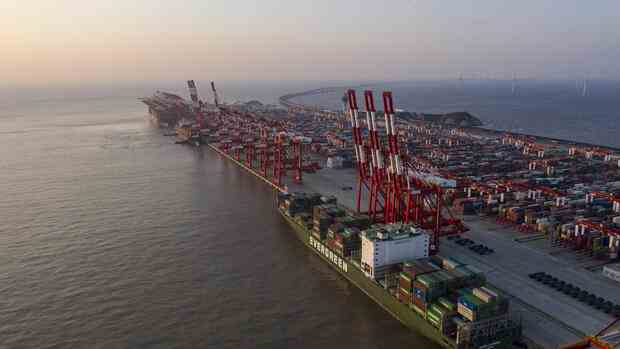Global trade has raised the standard of living for many, but now geopolitics could stand in the way of globalization.
(Photo: Bloomberg)
Brussels The global elite meets once a year in Davos. Nothing symbolizes the exuberance of the past decades as much as the World Economic Forum in the Swiss mountains, the annual meeting of top politicians, managers and experts.
That is why it makes one sit up and take notice when an economic turning point is to be proclaimed in Davos of all places.
In this year’s Global Risk Report, the World Economic Forum warns that geopolitics is eclipsing economic cooperation – with far-reaching consequences: “A long-term increase in inefficient production and rising prices are becoming more likely,” says the report. Only 16 percent of the decision-makers from politics, business, research and civil society surveyed expect the world to develop positively, and only eleven percent expect an economic recovery.
After globalization, despite its downsides, lifted millions of people out of poverty and narrowed the gap between industrialized and emerging countries, the new risk report prophesies somberly. “The new economic era could become one of the widening gaps between rich and poor countries and herald the first regression in human development in decades.” By 2024, the economic output of the emerging countries will fall by more than five percent compared to the pre-corona period, while the industrialized countries should already have overcome the GDP slump.
Top jobs of the day
Find the best jobs now and
be notified by email.
The theme of the conference, which begins next Tuesday, is set. The globalization that began with the fall of the Iron Curtain seems to be coming to an end. It was a golden age, especially for the Davos elite. What could come next sounds anything but promising. “The next decade will be marked by ecological and social crises,” according to the risk forecast.
World Economic Forum: Rising living costs hit the poorest particularly hard
The experts at the World Economic Forum name the rising cost of living as the greatest short-term danger. The poorest suffered the most from the high prices for energy and food, and in already fragile countries there is even a threat of state structures collapsing.
Rising interest rates and the already high national debt made it difficult for governments to cushion the economic hardship. Social inequality is exacerbated by new technologies such as artificial intelligence, which makes jobs for unskilled workers superfluous.
Internationally, conflicts take the place of cooperation. The study goes on to say that economic warfare is becoming the “norm”, and economic policy is increasingly serving to strengthen “self-sufficiency and independence from rivals in power”, while at the same time inhibiting the economic rise of other states.
By the end of the decade, governments and businesses will no longer be able to avoid environmental risks, climate change, but also species extinction and ecosystem collapse. Here humanity is approaching a “tipping point” that requires global efforts to prevent the worst.
More: China’s ambassador in Berlin sees a “Cold War mentality”
